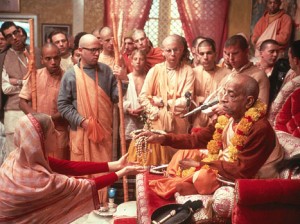
Vaishnavas teach that by chanting God’s names the soul can reawaken his original spiritual knowledge, live peacefully in this life and return to the spiritual realm, or Vaikuntha, the place of no anxiety, at the time of death.
There are four main sampradayas or Vaishnava lineages all based originally in India. Vaishnavas worship Lord Vishnu, Lord Rama, and Lord Krishna as different manifestations of the same Supreme Lord or one supreme divinity, although the styles of worship and emphasis differ.
The Vaishnava tradition has widely influenced South Asian culture through music, dance, theater and art. Vaishnavism’s heartfelt philosophy and poetic sacred texts integrate a profound theology with astute social discourse. The key Vaishnava sastras, or scriptures, are Krishna’s teachings in the Bhagavad-gita, included in the longer work, the Mahabharata), the Srimad Bhagavatam (one of the eighteen Puranas), the Ramayana, and the more recent 16th Century Sri Chaitanya-charitamrita.
ISKCON is part of the Gaudiya, or Chaitanya Vaishnava, tradition, which hails from the eastern regions of India. Gaudiyas place special emphasis on the teachings of 16th Century saint and avatar, Sri Caitanya Mahaprabhu. Gaudiya Vaishnavism in turn gave rise to the International Society for Krishna Consciousness (ISKCON), which was founded by Srila Prabhupada in 1966. His organization, ISKCON, has increased the awareness and growth of Vaishnavism worldwide since the late 1960s. Today Vaishnava teachings have crossed all geographic borders and proven relevant in addressing humanity’s essential needs.
